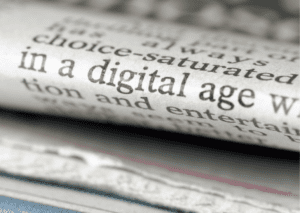The computer age has brought about a new era in human history. The digital age is upon us, and it has changed the way we live, work, and communicate. With the rise of technology, we have entered into a world that is both exciting and challenging. In this article, we will explore the meaning of the same, its advantages and disadvantages, and its impact on society. We will also discuss the digital divide and the ethical considerations that come with living in the digital age. Finally, we will offer some thoughts on how we can embrace the digital age while being mindful of its impact on society.
Defining the Digital Age, Information Age, and Electronic Age


This age is an era in which technology has become an integral part of our lives. It is characterized by the use of electronic devices, such as computers, smartphones, and the internet, to store, process, and transmit information. The information age, on the other hand, is a broader term that refers to the period in human history when information became a key driver of economic and social development. The electronic age, which preceded this age, was characterized by the widespread use of electronic devices, such as radios and televisions, for communication and entertainment.
This age is different from the electronic age in several important ways. First, technology has made it possible to store vast amounts of information in a compact form. This has led to the creation of huge databases that can be accessed and analyzed quickly and easily. Second, technology has made it possible to transmit information over long distances at high speeds. This has revolutionized the way we communicate, making it possible to connect with people all over the world in real-time. Finally, technology has made it possible to process information quickly and accurately. This has led to the creation of powerful tools for analysis and decision-making.
The Advantages of the Digital Age
This age has brought about many benefits to society. One of the biggest advantages of this age is the convenience it offers. With the advent of technology, we can now do things that were once impossible, such as shopping online, working from home, and accessing information from anywhere in the world. This has made our lives easier and more efficient.
Another advantage of this age is the increased access to information. With the internet, we can now access a vast amount of information on any topic we are interested in. This has democratized knowledge, giving everyone equal access to information that was once only available to a select few. This has led to a more informed and educated society.
Finally, this age has created new opportunities for innovation and creativity. With the rise of technology, we have seen the emergence of new industries, such as social media, e-commerce, and mobile apps. These industries have created new jobs and new ways of doing business, leading to economic growth and prosperity.
The Disadvantages of the Digital Age
While this era has brought about many benefits, it has also created new challenges and risks. One of the biggest disadvantages of the era is the loss of privacy. With the rise of technology, our personal information has become more vulnerable to theft and misuse. This has led to concerns about identity theft, cyberbullying, and government surveillance.
Another disadvantage of this age is the impact it has on our social lives. With the rise of social media, we have seen a decline in face-to-face communication and an increase in online interactions. This has led to concerns about the quality of our relationships and our ability to connect with others in meaningful ways.
Finally, this era has created new risks to our physical and mental health. With the rise of sedentary lifestyles and screen time, we have seen an increase in obesity, eye strain, and mental health problems, such as depression and anxiety.
The Impact of the Digital Age on Society


The digital age has had a profound impact on society. It has changed the way we live, work, and communicate. One of the biggest impacts of the digital age is the way it has transformed the economy. With the rise of e-commerce, we have seen a shift from traditional brick-and-mortar stores to online shopping. This has led to the closure of many physical stores and the loss of many jobs.
Another impact of the digital age is the way it has transformed the way we communicate. With the rise of social media, we have seen a shift from traditional forms of communication, such as phone calls and face-to-face conversations, to online interactions. This has led to concerns about the quality of our relationships and our ability to connect with others in meaningful ways.
Finally, the digital age has had a significant impact on education. With the rise of online learning, we have seen a shift from traditional classroom-based learning to digital learning. This has led to new opportunities for students to access education from anywhere in the world, but it has also raised concerns about the quality of online education and the lack of face-to-face interaction between students and teachers.
The Digital Divide: The “Haves” and “Have-Nots” in the Digital Age
One of the biggest challenges of this age is the digital divide. This divide refers to the gap between those who have access to technology and those who do not. This gap can be based on factors such as income, geography, and age.
Those who have access to this technology are often referred to as the “haves,” while those who do not have access are referred to as the “have-nots.” The digital divide can have significant consequences for those who are on the wrong side of the divide. For example, those who do not have access to this technology may struggle to access information, apply for jobs, or connect with others.
Balancing the Advantages and Disadvantages of the Digital Age
While the digital age has brought about many benefits, it has also created new challenges and risks. To make the most of the digital age, we need to find ways to balance the advantages and disadvantages. This requires a thoughtful approach that takes into account the potential risks and benefits of this technology.
One way to balance the advantages and disadvantages of the digital age is to focus on education and awareness. By educating people about the risks and benefits of this technology, we can help them make informed decisions about how to use it. This can help to mitigate the risks while maximizing the benefits.
Another way to balance the advantages and disadvantages of this era is to focus on regulation and policy. By creating laws and regulations that protect privacy, promote fairness, and ensure access to this technology, we can help to create a more equitable and just society.
The Future of the Digital Age
This age is still in its infancy, and it is difficult to predict exactly how it will evolve in the future. However, there are some trends that are likely to shape the future of the this age. One of the biggest trends is the rise of artificial intelligence (AI) and machine learning. These technologies have the potential to revolutionize many industries, from healthcare to finance to transportation.
Another trend that is likely to shape the future of this age is the rise of the internet of things (IoT). The IoT refers to the network of devices, such as smart appliances and wearable devices, that are connected to the internet. This network has the potential to create new opportunities for innovation and efficiency, but it also raises concerns about privacy and security.
Finally, the digital age is likely to continue to transform the way we live, work, and communicate. As this technology becomes more advanced and pervasive, we can expect to see new opportunities and challenges emerge.
Ethical Considerations in the Digital Age


Living in the digital age raises a number of ethical considerations. One of the biggest ethical concerns is the potential for digital technology to be used for nefarious purposes, such as cybercrime and cyberterrorism. This has led to calls for greater regulation and oversight of this technology.
Another ethical concern is the impact of this technology on privacy. With the rise of this technology, we have seen an increase in the collection and use of personal data. This has raised concerns about the potential for misuse of this data by corporations and governments.
Finally, there are ethical concerns related to the impact of this technology on society. For example, there are concerns about the impact of automation on jobs, and the potential for this technology to exacerbate existing inequalities.
Conclusion: Embracing the Digital Age While Being Mindful of its Impact on Society
The digital age has brought about many benefits, but it has also created new challenges and risks. To make the most of the digital age, we need to find ways to balance the advantages and disadvantages. This requires a thoughtful approach that takes into account the potential risks and benefits of this technology.
As we move forward into the digital age, it is important to remember that technology is not inherently good or bad. It is how we use it that determines its impact on society. By embracing this age while being mindful of its impact on society, we can create a future that is both exciting and sustainable.
As we navigate the digital age, it is important to stay informed and engaged. By staying up-to-date on the latest developments in this technology, we can make informed decisions about how to use it. We encourage you to continue learning about the digital age and its impact on society.



We hope you’re enjoying reading our blogs… Don’t forget to secure your browsing experience with Nord VPN. Click the banner below to learn more
More To Explore
Redefining Digital Marketing in 2024: 10 Game-Changing Trends
In the ever-evolving world of digital marketing, staying ahead of the curve is essential. As we approach 2024, it’s crucial to be aware of the
SEO Mania-7 Proven Strategies for Explosive SEO Growth in 2024
Understanding the Importance of SEO in 2024 In the ever-evolving world of SEO, staying ahead of the curve is crucial to your online success. As